British and Colonial Antecedents of American Liberties:
An exhibition of rare books on early American law from the collection of Sid Lapidus at the Wolf Law Library, William & Mary Law School, October 1, 2019 – March 15, 2020
BOOKS PIVOTAL TO THE DEVELOPMENT OF VIRGINIA LAW
|
A Booke of Entries (1614) Drawing from Sir Edward Coke's experience both as solicitor and judge, his book of precedents claims to correct some of the problems of earlier works and to include only previously unpublished entries. Despite these claims, many of the same pleadings are found in his Reports, and, unlike William Rastell (1508–1565), Coke (1552–1634) neglected to add precedents for some of the more contemporary issues. Regardless of any deficiencies, this was one of the four works the redactors of the 1705 revisal of the Virginia laws in force ordered out of England in 1699. This copy, on loan from a private library, previously belonged to Charles Carroll of Carrollton, a signer of the Declaration of Independence. His bookplate is on the front pastedown. Other previous owners' signatures are on the title page. |
|
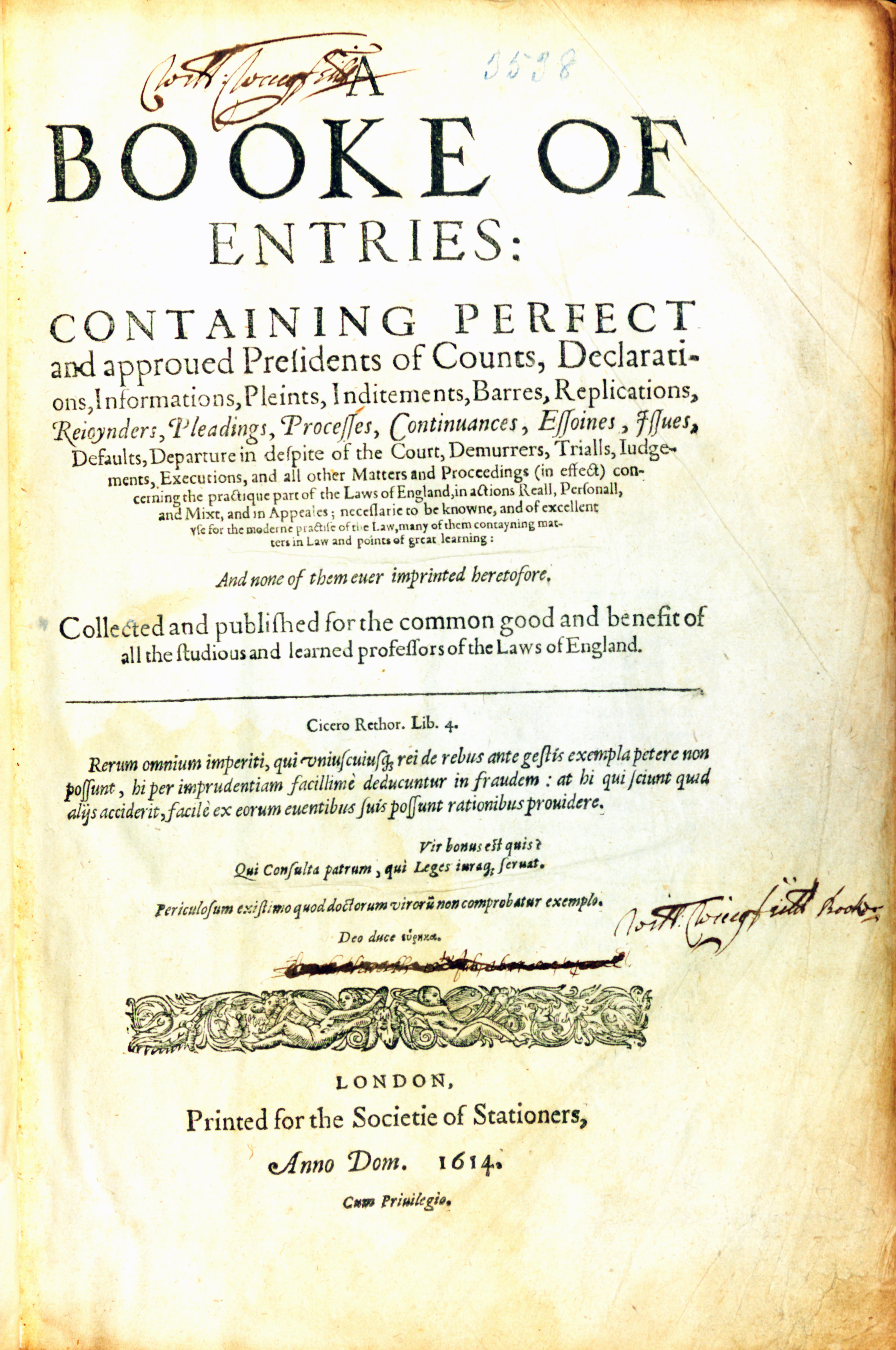
|
Coke, Sir Edward. A Booke of Entries: Containing Perfect and Approved Presidents of Counts, Declarations, Informations, Pleints, Inditements, Barres, Replications, Reioynders, Pleadings, Processes, Continuances, Essoines, Issues, ... [etc.]. 1st ed. London: Printed for the Societie of Stationers, 1614. Private collection. |
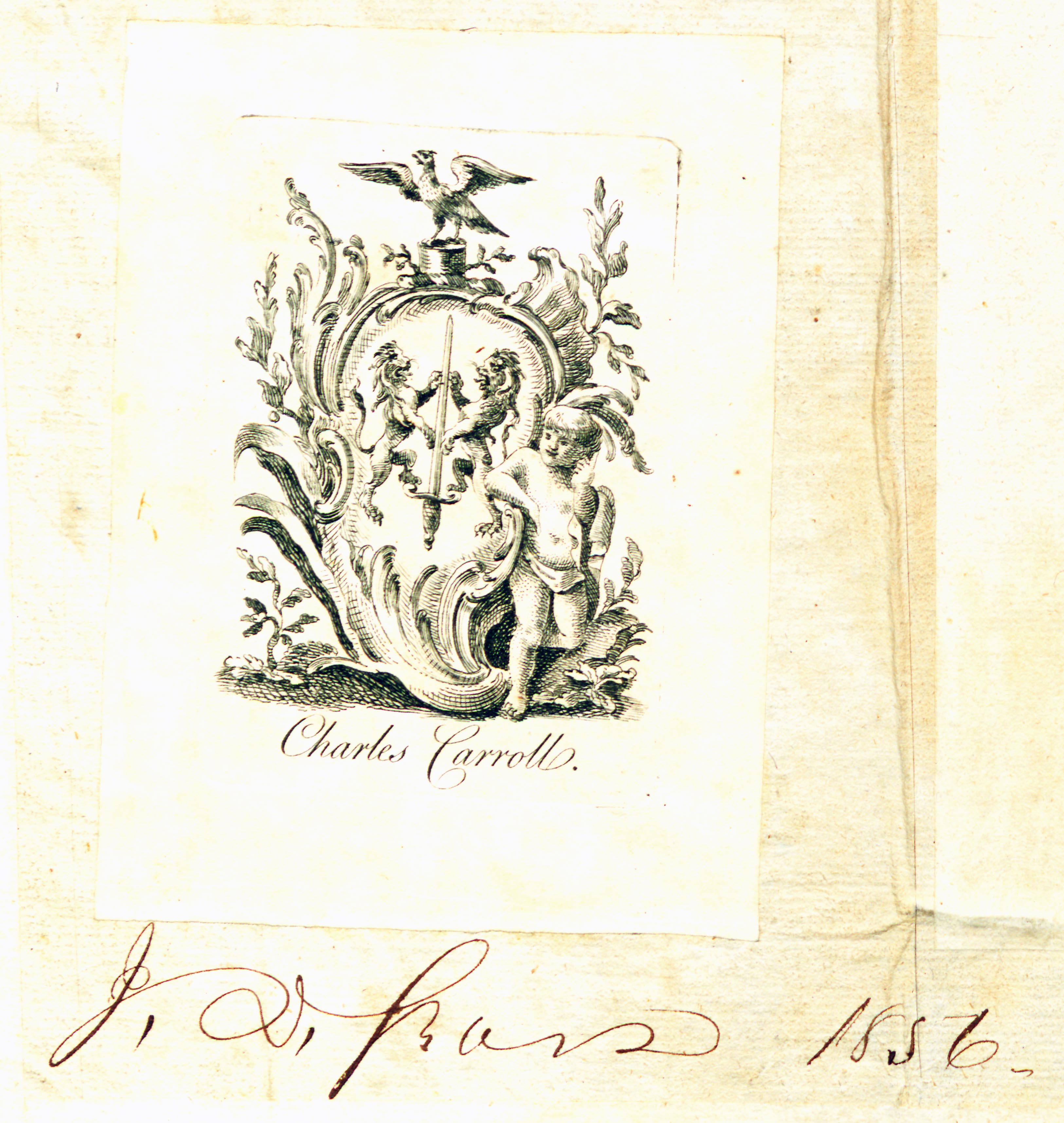
|
Bookplate and prior owner's signature, front pastedown, Sir Edward Coke, A Booke of Entries, 1614. Private collection. |
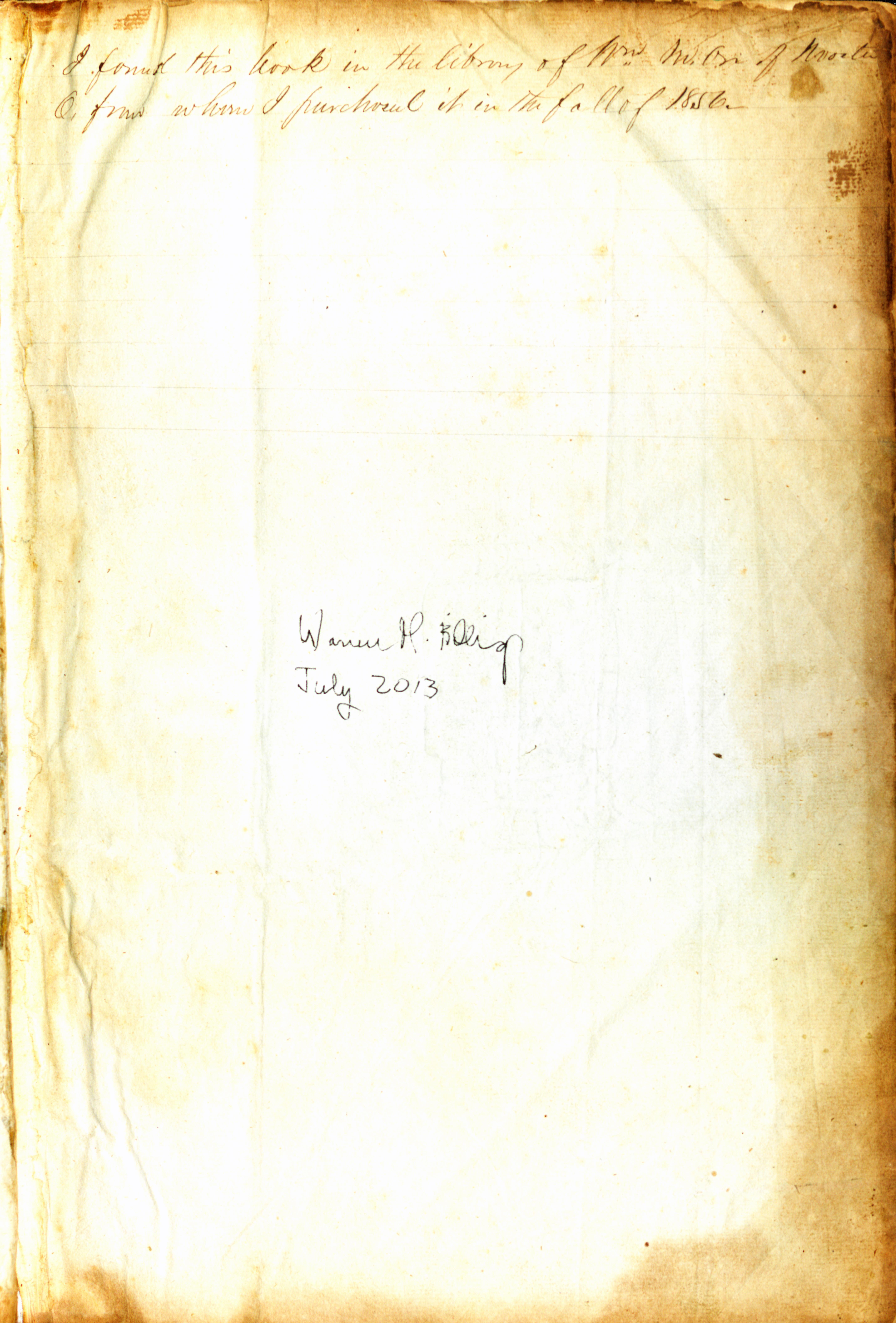
|
Notes and signature, front free endpaper, Sir Edward Coke, A Booke of Entries, 1614. Private collection. |
|
An Exact Abridgment in English, Of the Eleven Books of Reports (1650) Sir Edward Coke (1552–1634) published the first eleven books of his reports between 1600 and 1615. They were unlike any reports before or since. Organized by subject instead of more linearly by case, they represent essays on legal principles and may have been intended as much for the student as the practitioner. They enjoyed such an esteemed reputation that they were frequently cited merely as "The Reports." In his abridgment which first appeared in 1650, Ireland attempts to winnow Coke's commentary and present only the "very pith and substance" of the cases reported. This copy is marked by the signatures of prior owners on the title page and the armorial bookplate of Noble Wallwyn Pytts on the front pastedown. Manuscript notes on the blank pages at the end of the book may be in the hand of Pytts. |
|
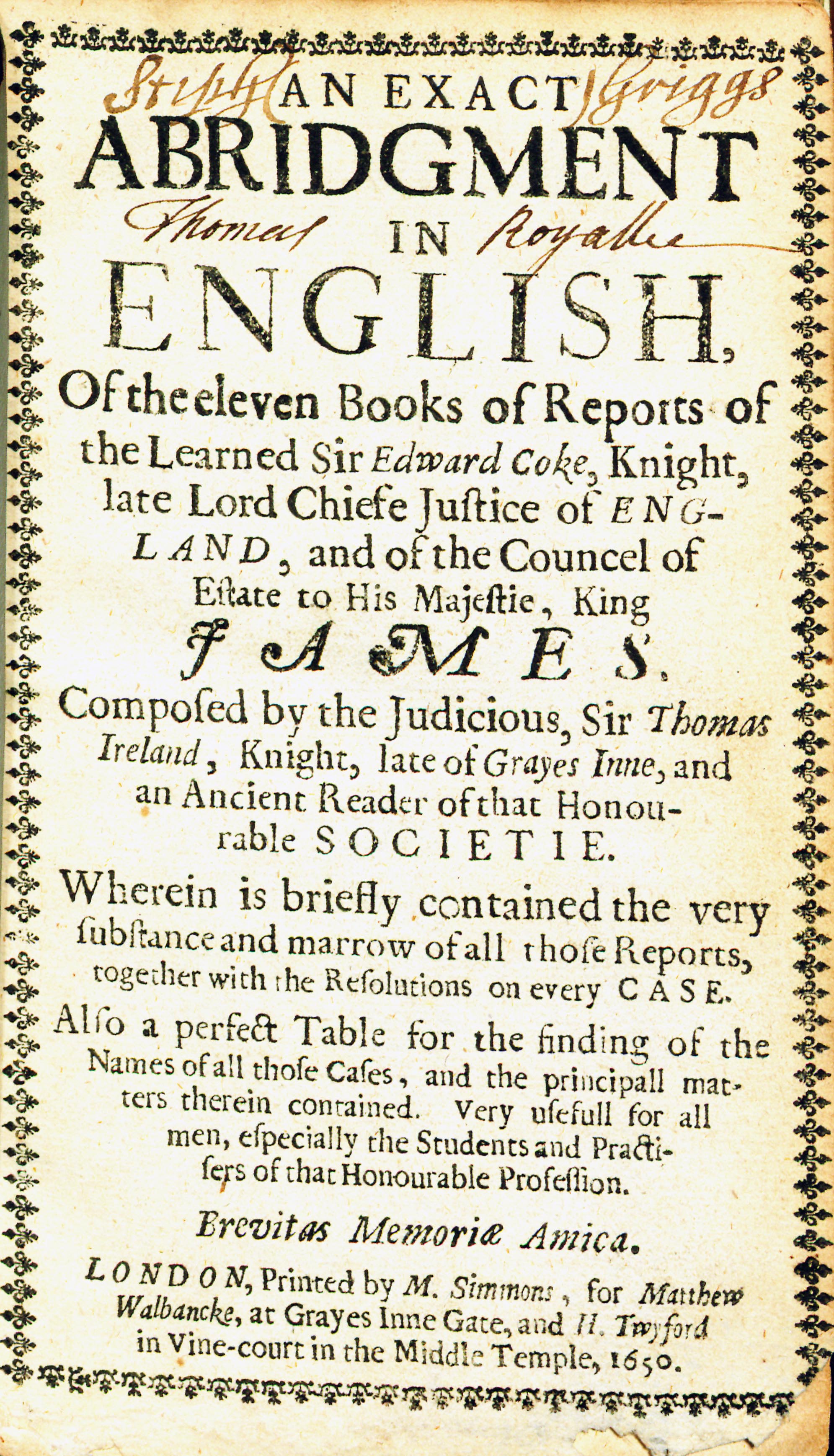
|
Coke, Sir Edward. An Exact Abridgment in English, Of the Eleven Books of Reports of the Learned Sir Edward Coke, Knight, Late Lord Chiefe Justice of England, and of the Councel of Estate to His Majestie, King James. Edited by Sir Thomas Ireland. 1st ed. London: Printed by M. Simmons, For Matthew Walbancke, 1650. |
|
The Interpreter (1658) In The Interpreter, his most famous and controversial work, John Cowell (1554–1611) provided a much-needed compilation of common law terms and their definitions. To these he added similar civil law terms. Unfortunately, a few key definitions included the author's views on absolute monarchy and the power of Parliament. After numerous attacks from common lawyers such as Sir Edward Coke (1552–1634), the book was suppressed by James I. Nevertheless, it remained the "standard dictionary of English law" well into the eighteenth century. The title page of this copy is signed by a former owner, "J. Barry." |
|
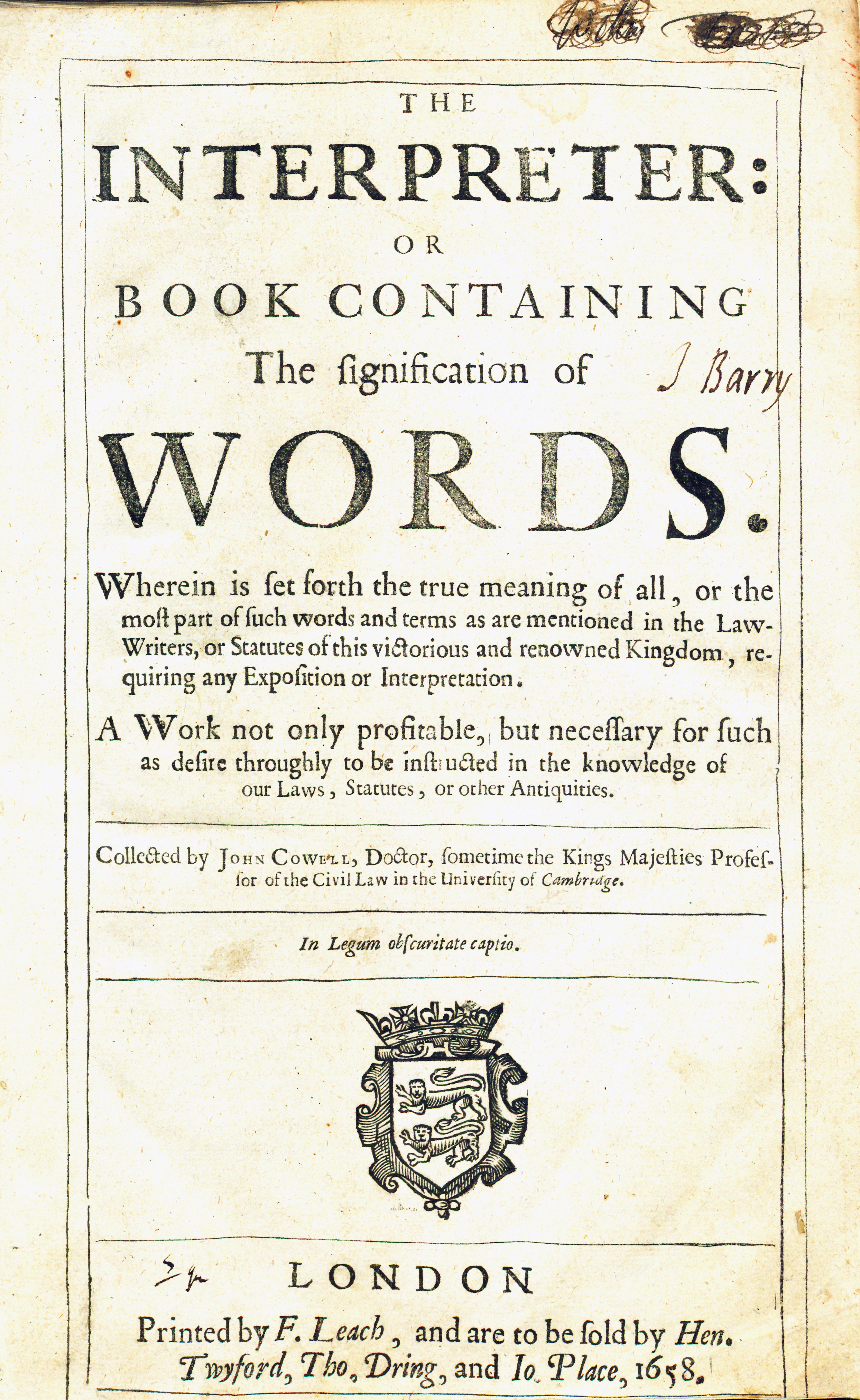
|
Cowell, John. The Interpreter: or Book Containing the Signification of Words. 3rd ed. London: Printed by F. Leach, 1658. |
|
The Countrey Justice (1635) The Countrey Justice may have been the first work of its kind to adopt an alphabetical arrangement of topics. First appearing in 1618, Michael Dalton (1564–1644) created the manual to aid justices with their duties out of sessions. For each subject, he provides a plain description of the law followed by advice on how to handle issues likely to come before the justices. Its utilitarian value contributed to its popularity and wide usage both in England and the colonies well into the middle of the eighteenth century. In a 1666 act requiring courts to purchase copies of law books, the General Assembly specifically named The Countrey Justice. |
|
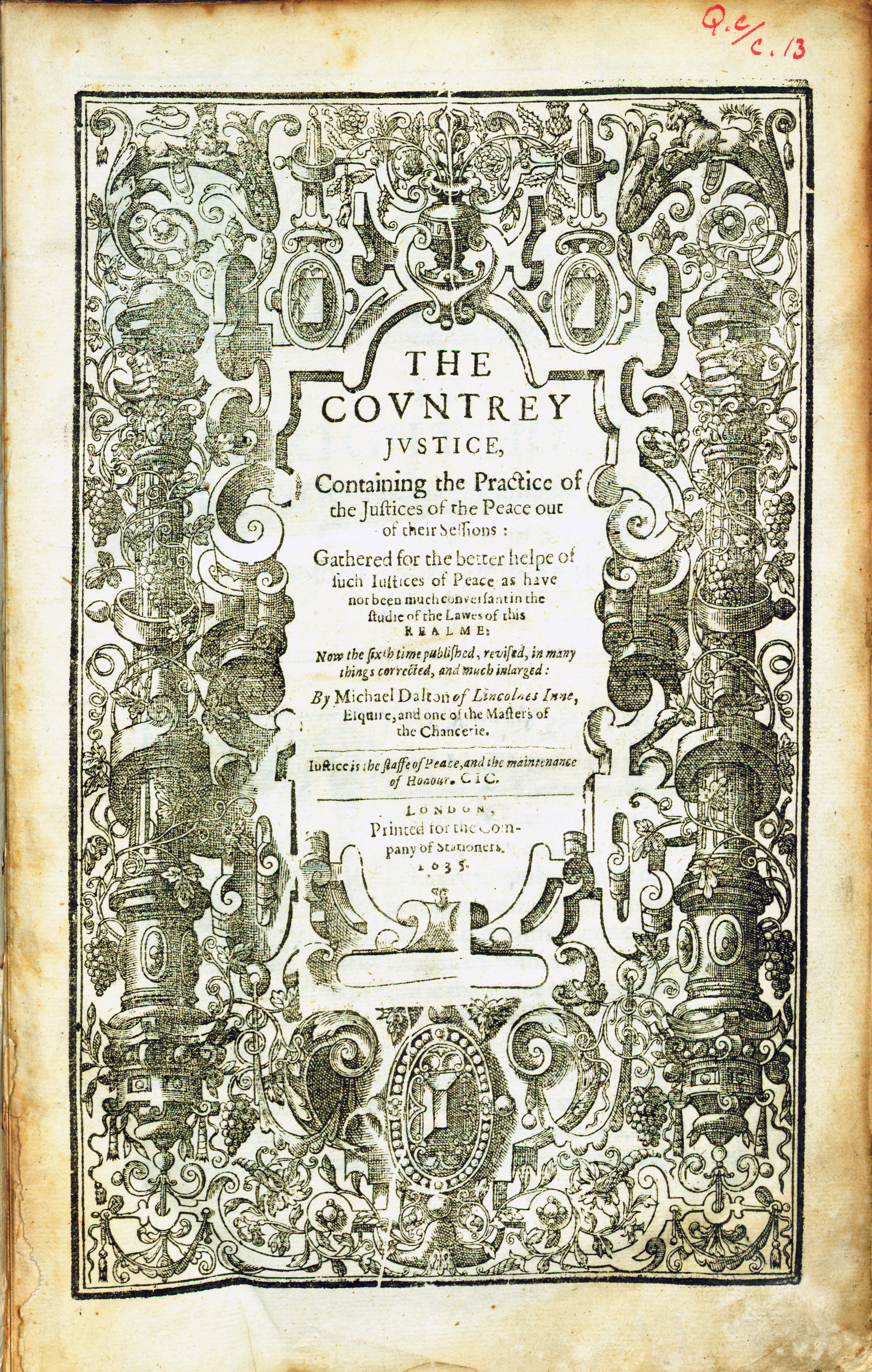
|
Dalton, Michael. The Countrey Justice, Containing the Practice of the Justices of the Peace Out of their Sessions: Gathered for the Better Helpe of Such Justices of Peace as Have Not Been Much Conversant in the Studie of the Lawes of This Realm. 6th ed. London: Printed for the Company of Stationers, 1635. |
|
The Office and Authoritie of Sherifes (1628) Michael Dalton (1564–1644) produced Officium Vicecomitum: The Office and Authoritie of Sherifes in 1623. This abridged version followed five years later. Despite a growing number of competitors, Dalton's work remained a standard into the eighteenth century. In recognition of its importance, the General Assembly specifically named The Office and Authoritie of Sherifes in a 1666 act requiring courts to purchase copies of law books. This copy is signed by a former owner on both the title page and dedication. |
|

|
Dalton, Michael. The Office and Authoritie of Sherifes. 1st ed. London: Printed for the Company of Stationers, 1628. |
|
The Book of Oaths (1689) The presumed author, Richard Garnet (fl. mid-seventeenth century), was an obscure Jesuit priest. This is the second of three editions. Councillor Benjamin Harrison (1645–1712) purchased a copy in 1699 for use by the redactors of the 1705 revisal of the Virginia statutes in force. This copy belonged to Charles Gerard, second earl of Macclesfield (c.1659–1701), and is now in a private collection. |
|
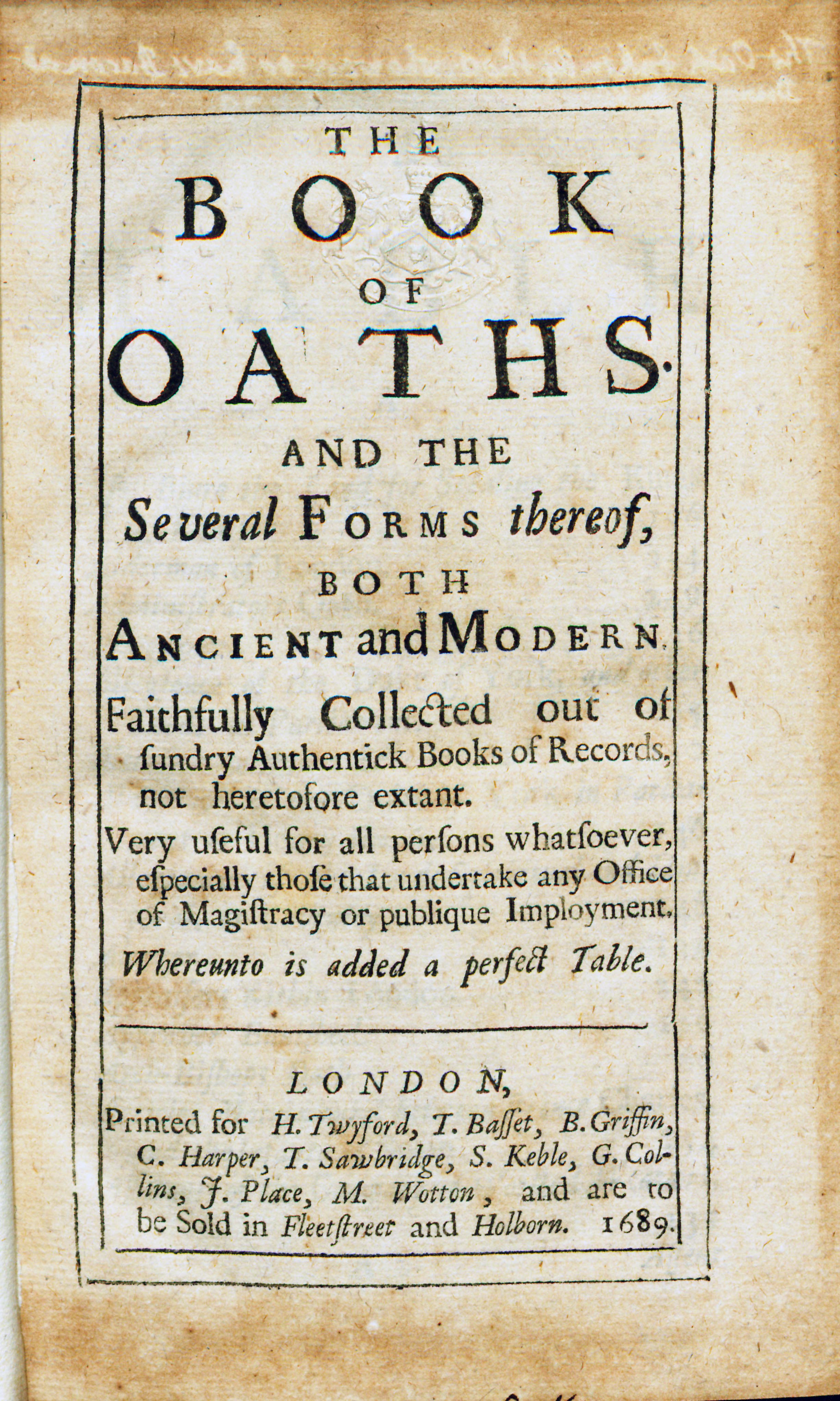
|
Garnet, Richard. The Book of Oaths, and the Several Forms Thereof, both Ancient and Modern Faithfully Collected Out of Sundry Authentick Books of Records, not Heretofore Extant. 2nd ed. London: Printed for H. Twyford, T. Basset, B. Griffin, C. Harper, T. Sawbridge, S. Keble, G. Collings, J. Place, M. Wotton, 1689. Private collection. |
|
Registrum Brevium (1687) The Registrum Brevium or "Register of Writs" holds a premier place of importance in the history of medieval English law. Its influence on early common law is inestimable. Multiple manuscript copies abound from as early as 1227 with no two exactly alike. Attributed to Ralph de Hengham (1235?–1311), William Rastell (1508–1565) produced the first printed version in 1531. This edition, expanded and considered more accurate than previous editions, appeared in 1687 and includes Le Digest des Briefs Originals et des Choses Concernants Eux by Simon Theloall (fl. sixteenth century). Councillor Benjamin Harrison (1645–1712) purchased a copy in 1699 for use by the redactors of the 1705 revisal of the Virginia statutes in force. This copy, from the Wolf Law Library's George Wythe Collection, features manuscript annotations on the title page. |
|

|
Hengham, Ralph de and Simon Theloall. Registrum Brevium Tam Originalium, Quam Judicialum. 4th ed. London: Printed by the Assigns of Richard and Edward Atkins, 1687. Wolf Law Library. |
|
Eirenarcha (1581) The publication of Eirenarcha satisfied a long-standing need for a comprehensive manual on the various duties and powers of the justice of the peace. With his in-depth treatment, William Lambarde (1536–1601) provides an invaluable description of late sixteenth century local government as administered by the justices. Unlike the alphabetical arrangement of later manuals, Eirenarcha is divided into two books: an overview, and chapters based on cases in and out of sessions. It proved to be both useful and extremely popular, and remained the standard work in its subject for some time. This copy features seventeenth century notes and annotations to the front and rear endpapers. |
|

|
Lambarde, William. Eirenarcha: Or of the Office of the Justices of Peace, in two Bookes. 1st ed. London: Imprinted by Ra. Newberry and H. Bynneman, 1581. |
|
Magna Carta (1556) and Magna Charta (1608) First printed around 1508 by Richard Pynson, multiple editions of the Magna Carta appeared in the sixteenth and seventeenth centuries. Antiquarians revived interest in the "Great Charter" during the sixteenth century, but it was during the seventeenth century that its political importance grew as writers used it against the Stuart monarchy. Following this intellectual thread, American colonists viewed Magna Carta as a document guaranteeing their liberties. The 1556 edition is revised from the version printed by Thomas Berthelet in 1531 and includes other ancient statutes. This copy features a few scattered notes from a previous owner. The 1608 edition includes both ancient and contemporary statutes. The copy here also features notes from a previous owner as well as a signature on the rear free endpaper. |
|
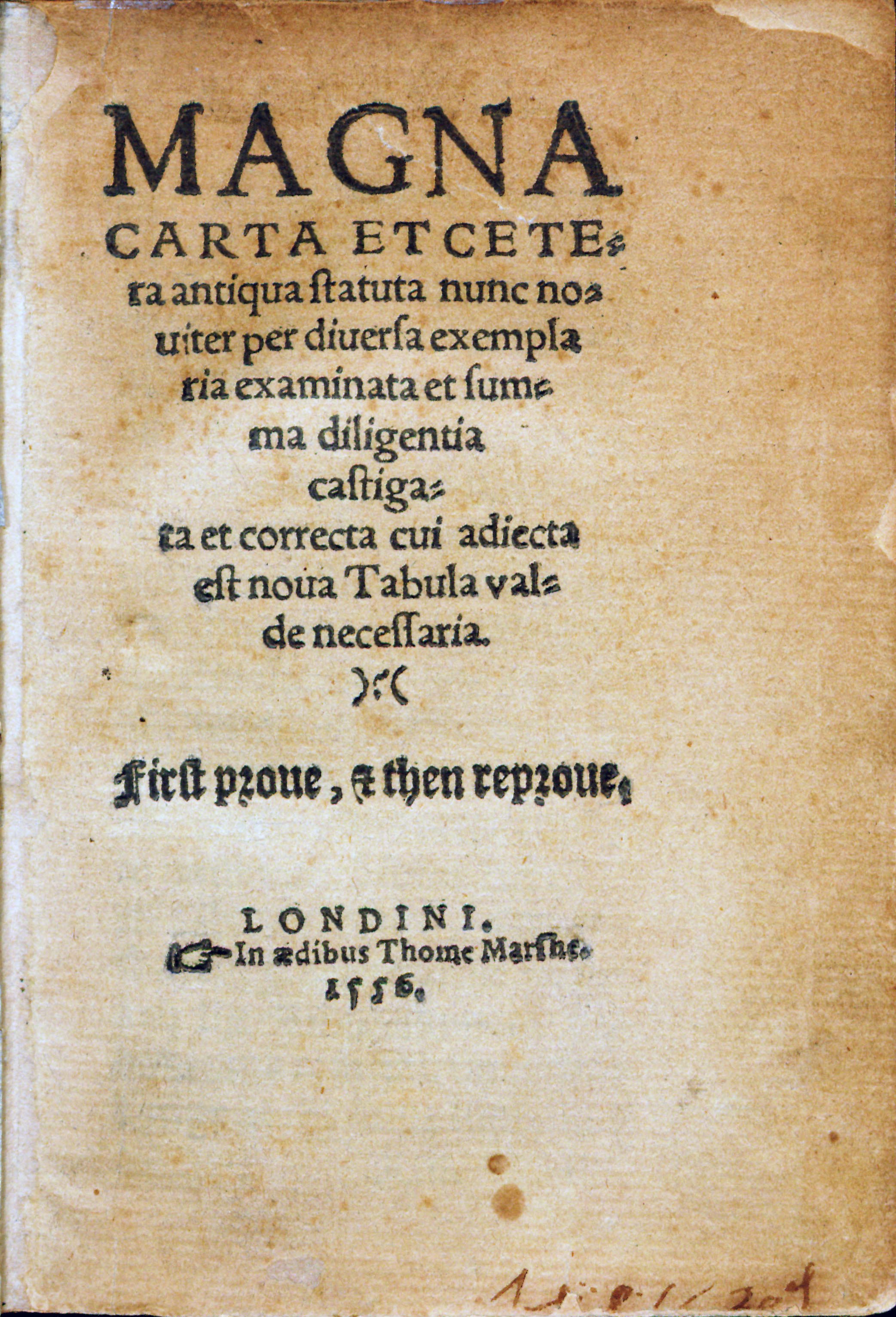
|
Magna Carta et cetera Antiqua Statuta Nunc Nouiter per Diuersa Exemplaria Examinata et Summa Diligentia Castigata et Correcta Cui Adiecta est Noua Tabula Valde Necessaria. London: In Aedibus Thomas Marshe, 1556. |
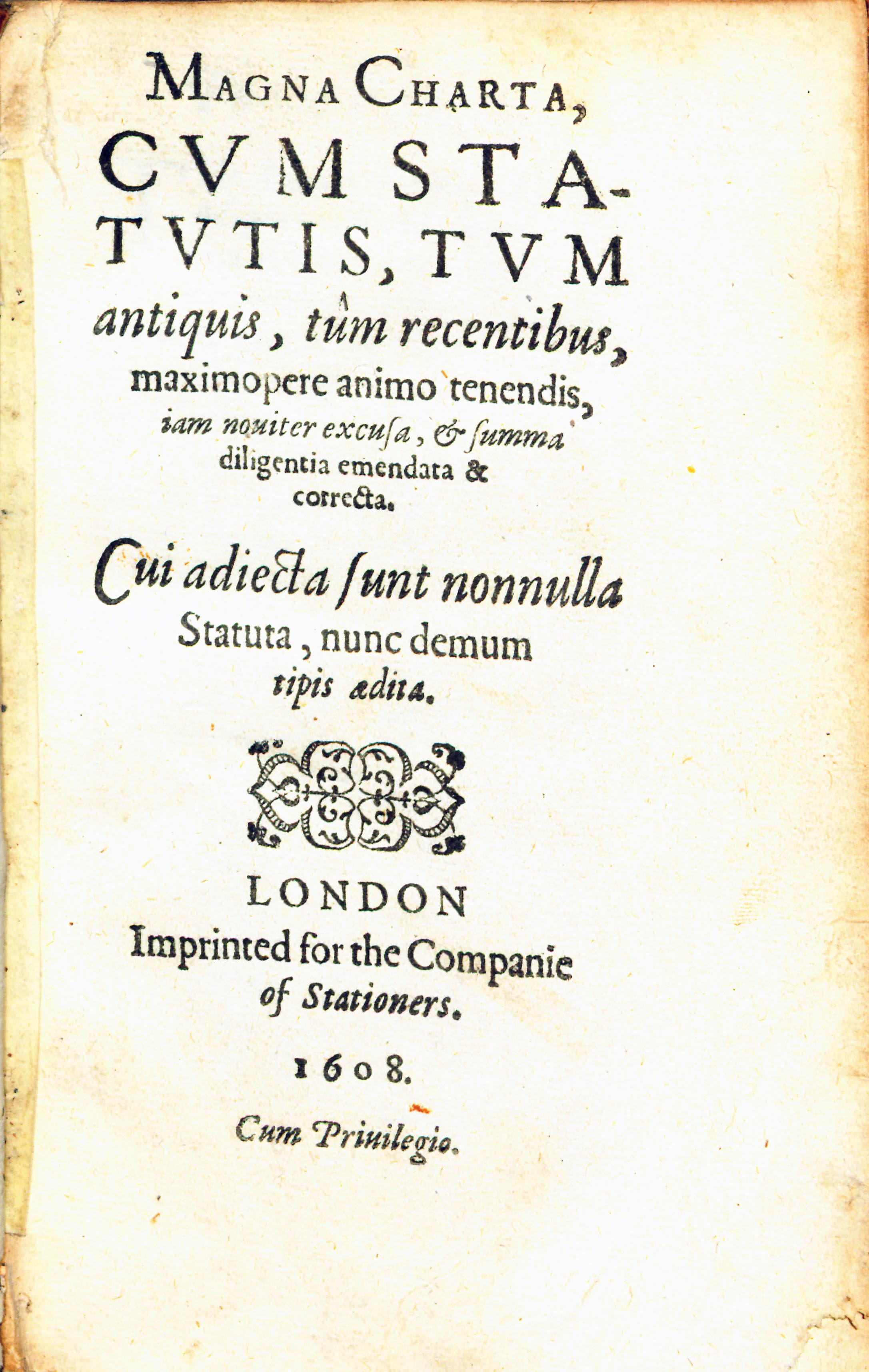
|
Magna Charta, Cum Statutis, Tum Antiquis, Tum Recentibus, Maximopere Animo Tenendis. London: Imprinted for the Companie of Stationers, 1608. |
|
An Exact Abridgment of all the Public Acts of Assembly in Virginia (1737) A prominent Virginia lawyer, John Mercer (1705–1768) owned one of the largest law libraries in Virginia. His library was the school for his nephew George Mason (1725– 1792), the author of the Virginia Declaration of Rights and the Virginia Constitution of 1776, and a delegate to the Constitutional Convention of 1787. William Parks (d. 1750) recruited Mercer to prepare the Exact Abridgment, which was one of the first Virginia-specific law books written by a Virginian and printed by a Virginian. This copy is on loan from the Library of Virginia. |
|
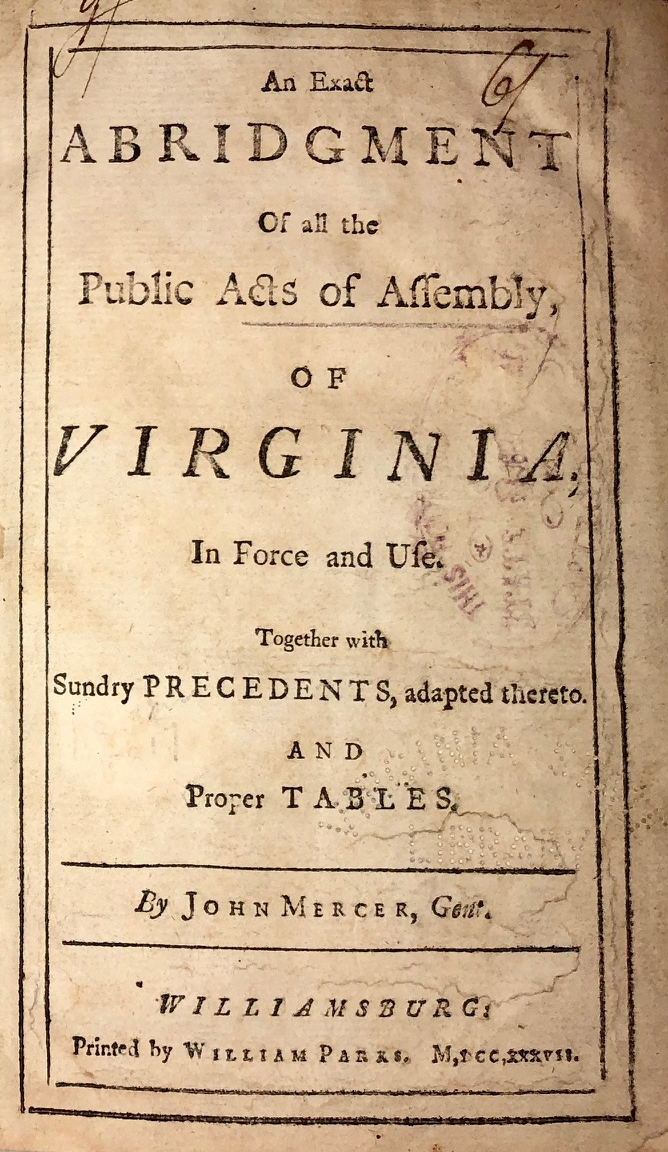
|
Mercer, John. An Exact Abridgment of all the Public Acts of Assembly in Virginia , in force and Use: Together with Sundry Precedents adapted thereto and Proper Tables. Williamsburg: Printed by William Parks, 1737. Library of Virginia. |
|
The Lawes of Virginia Now in Force (1662) The Lawes of Virginia Now in Force was the first printed text of acts of the Virginia General Assembly. It was set from a manuscript copy of the 1661/62 revision of the statutes in force. As instructed by Gov. Sir William Berkeley (1605–1677), his deputy Francis Moryson (bef. 1628–1680/81) and Clerk of the House of Burgess Henry Randolph drafted the revisal, which the General Assembly enacted. Randolph sent the manuscript to Berkeley who was in London. Berkeley engaged bookseller Anna Seile who hired Ellen Coates to print the book. Randolph sold the print run in the colony. Surviving copies are extraordinarily rare. This image is from the copy in the Tracy W. McGregor Library, American History Collection, Albert and Shirley Small Special Collections Library, University of Virginia. |
|
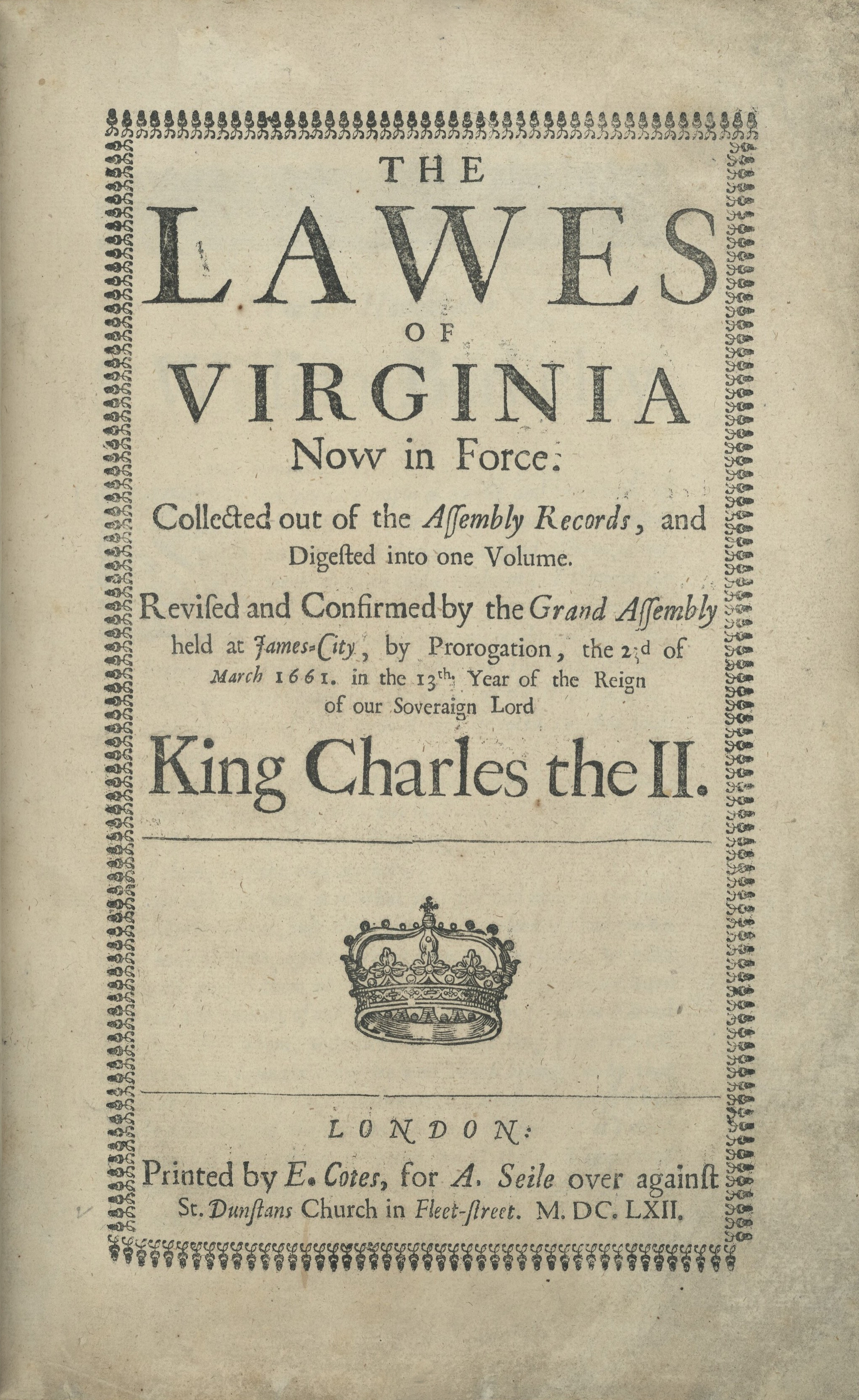
|
Moryson, Francis. The Lawes of Virginia Now in Force: Collected Out of the Assembly Records, and Digested into One Volume. Revised and Confirmed by the Grand Assembly held at James-City by Prorogation the 23d of March 1661 in the 13th year of the Reign of Our Soveraign Lord King Charles the II. London: Printed by E. Cotes for A. Seile, 1662. University of Virginia. |
|
Officina Brevium (1679) Officina Brevium is a book of forms for moving litigation in the Court of Common Pleas. Councillor Benjamin Harrison (1645–1712) purchased a copy in 1699 for use by the redactors of the 1705 revisal of the Virginia statutes in force. |
|
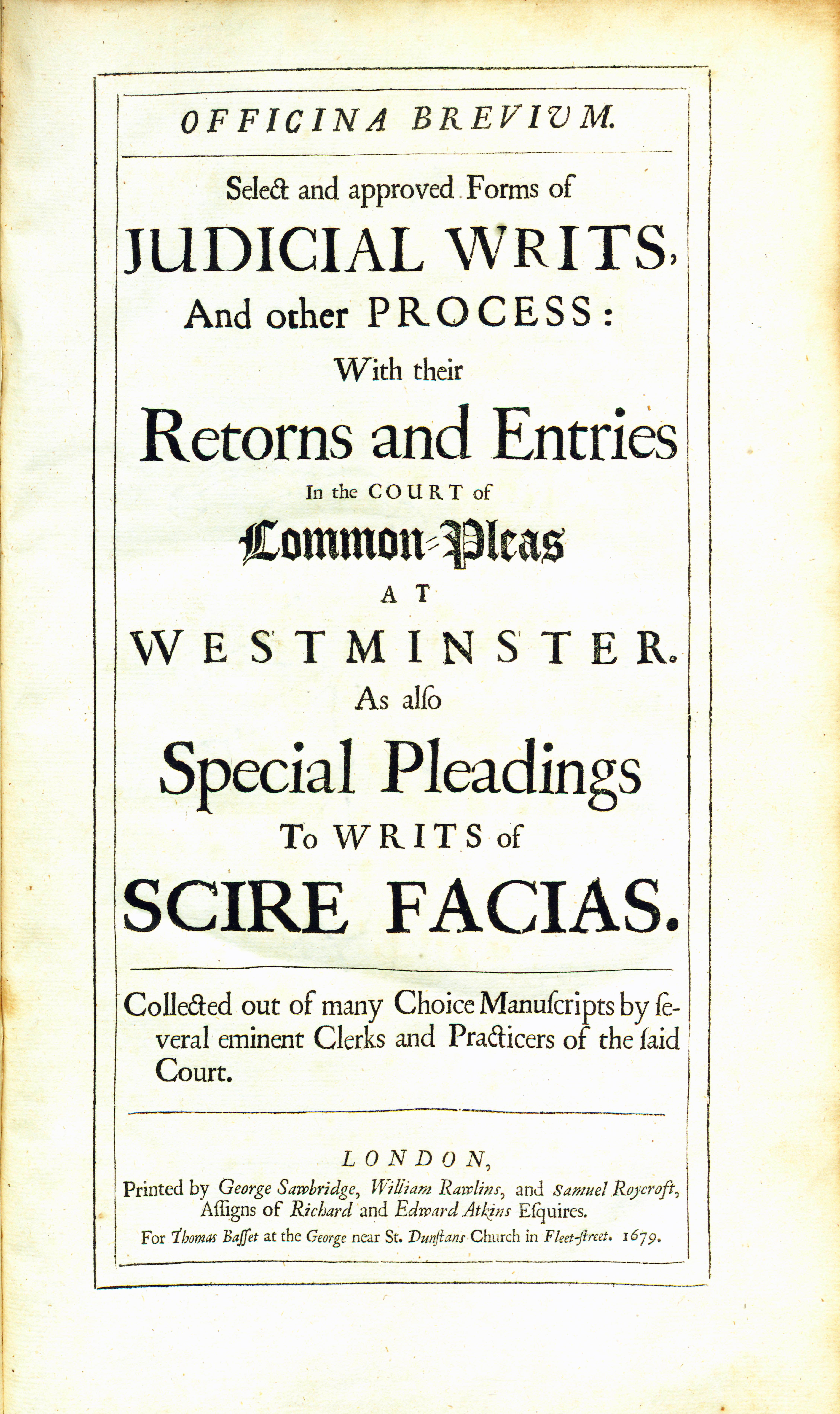
|
Officina Brevium: Select and Approved Forms of Judicial Writs, and Other Process: With Their Retorns and Entries in the Court of Common Pleas at Westminster, As also Special Pleadings to Writs of Scire Facias. London: Printed by George Sawbridge, William Rawlins, and Samuel Roycroft, Assigns of Richard and Edward Atkins, 1679. |
|
A Collection of All the Acts of Assembly, Now in Force (1733) William Parks (1699–1750) set up the first Virginia printing press and book bindery on Duke of Gloucester Street a few doors down from the Capitol. Encouraged by Lt. Gov. William Gooch (1681–1751), the General Assembly contracted with him to compile a full-text edition of the statutes in force. He was assisted by George Webb (d.1758). A Collection of all the Acts of Assembly was first Virginia-specific law book printed in Virginia. This copy is from the Wolf Law Library's George Wythe Collection. |
|
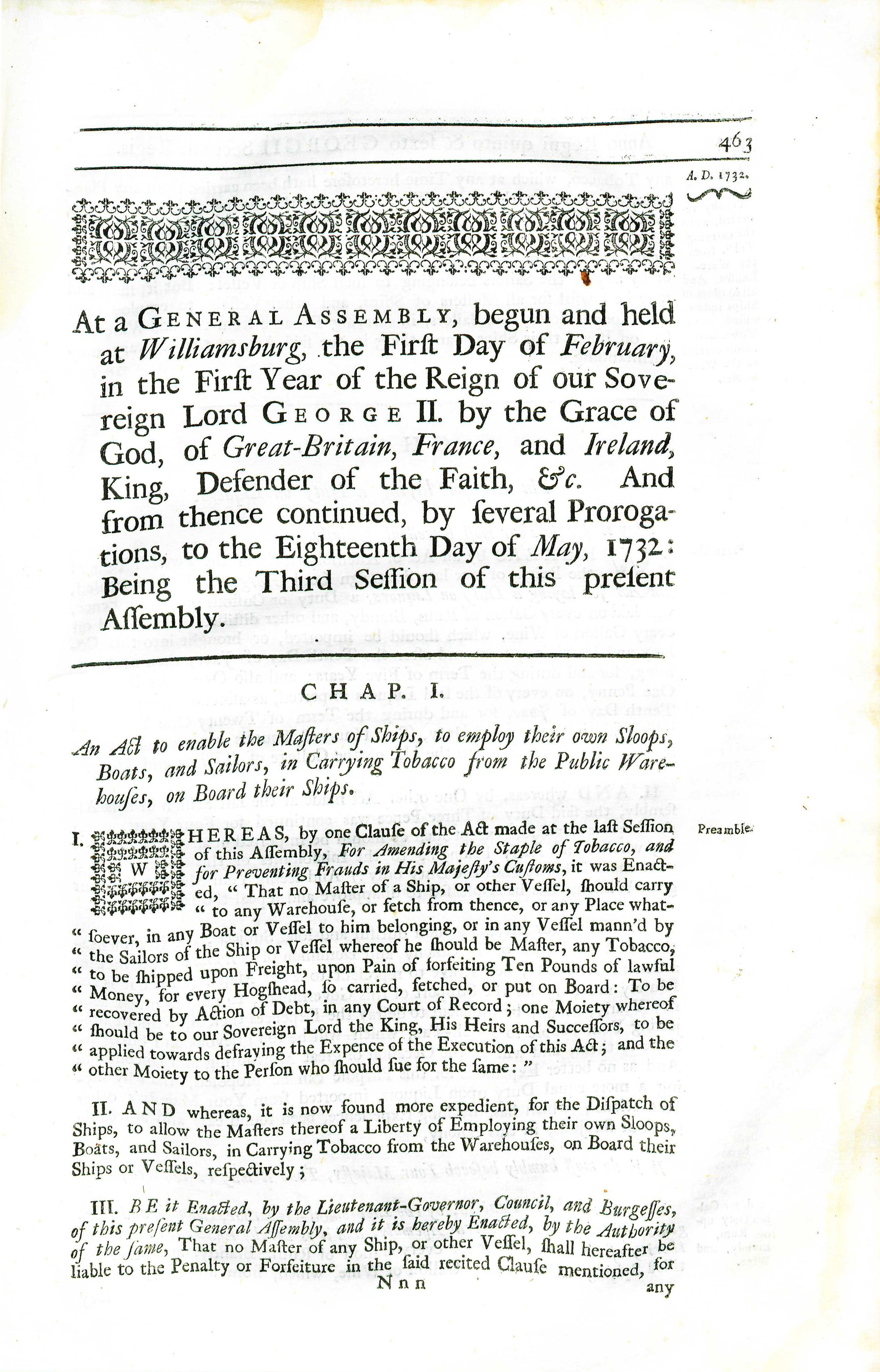
|
Parks, William. A Collection of All the Acts of Assembly, Now in Force, in the Colony of Virginia with the Titles of Such as are Expir'd, or Repeal'd and Notes in the Margin, Shewing How, and at What Time, They Were Repeal'd. Williamsburg: Printed by William Parks, 1733. Wolf Law Library volume lacking title page. |
|
De Pace Regis et Regni (1623) First published in 1609, Ferdinando Pulton's (1536–1618) treatise provides a discussion of offenses current with all the developments in criminal law in the latter half of the sixteenth century. Thorough and well-organized, it constituted a major addition to the literature of criminal law. This copy is on loan from a private library. |
|

|
Pulton, Ferdinando. De Pace Regis et Regni viz. A Treatise Declaring Which be the Great and Generall Offences of the Realme, and the Chiefe Impediments of the Peace of the King and the Kingdome. 4th ed. London: Printed for the Companie of Stationers, 1623. Private collection. |
|
A Complete Collection of All the Laws of Virginia (1694) An unauthorized but updated edition of The Lawes of Virginia Now in Force, often referred to as "Purvis" so named for its supposed undertaker the ship captain John Purvis. Even though the General Assembly suppressed it, it remained in use well into the eighteenth century. This copy is on loan from the Library of Virginia. |
|
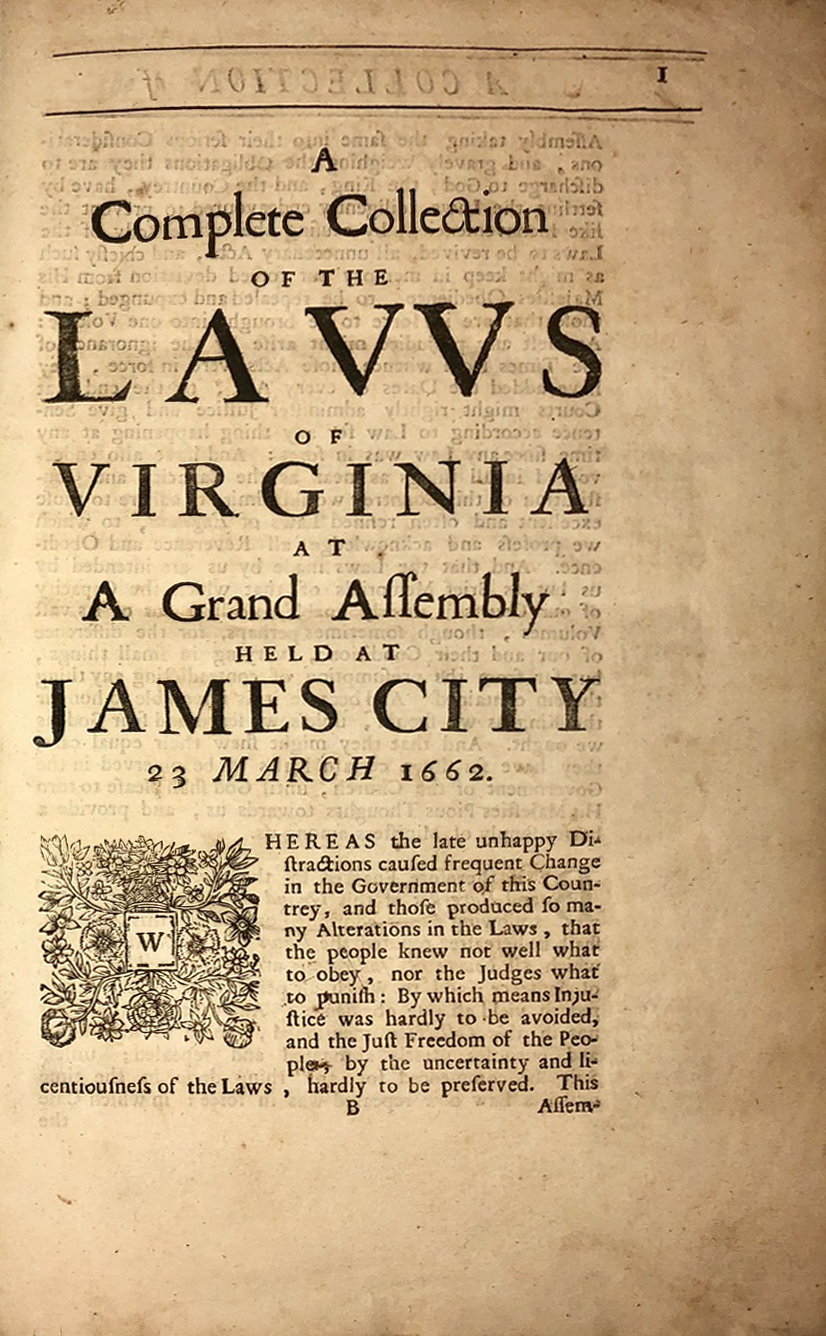
|
Purvis, John. A Complete Collection of all the Laws of Virginia Now in Force: Carefully Copied from the Assembly Records. London: Printed by T J for J P, [1684?]. Library of Virginia. |
|
A Collection in English, of the Statutes Now in Force (1615) First published by William Rastell (1508–1565) in 1557, this Collection brought together all public statutes still in force at the time of its release. In part a version of the statutes at large and in part an abridgment, the work arranged the law alphabetically by subject with each statute presented in its original language. Later editions would include translations of the French and Latin statutes. It proved to be a very popular, often reprinted work. This copy on loan from a private collection matches the edition provided by Sir Edwin Sandys (1561–1629) to George Thorpe (1576–1622) as he created the Council of State law library in 1621. |
|
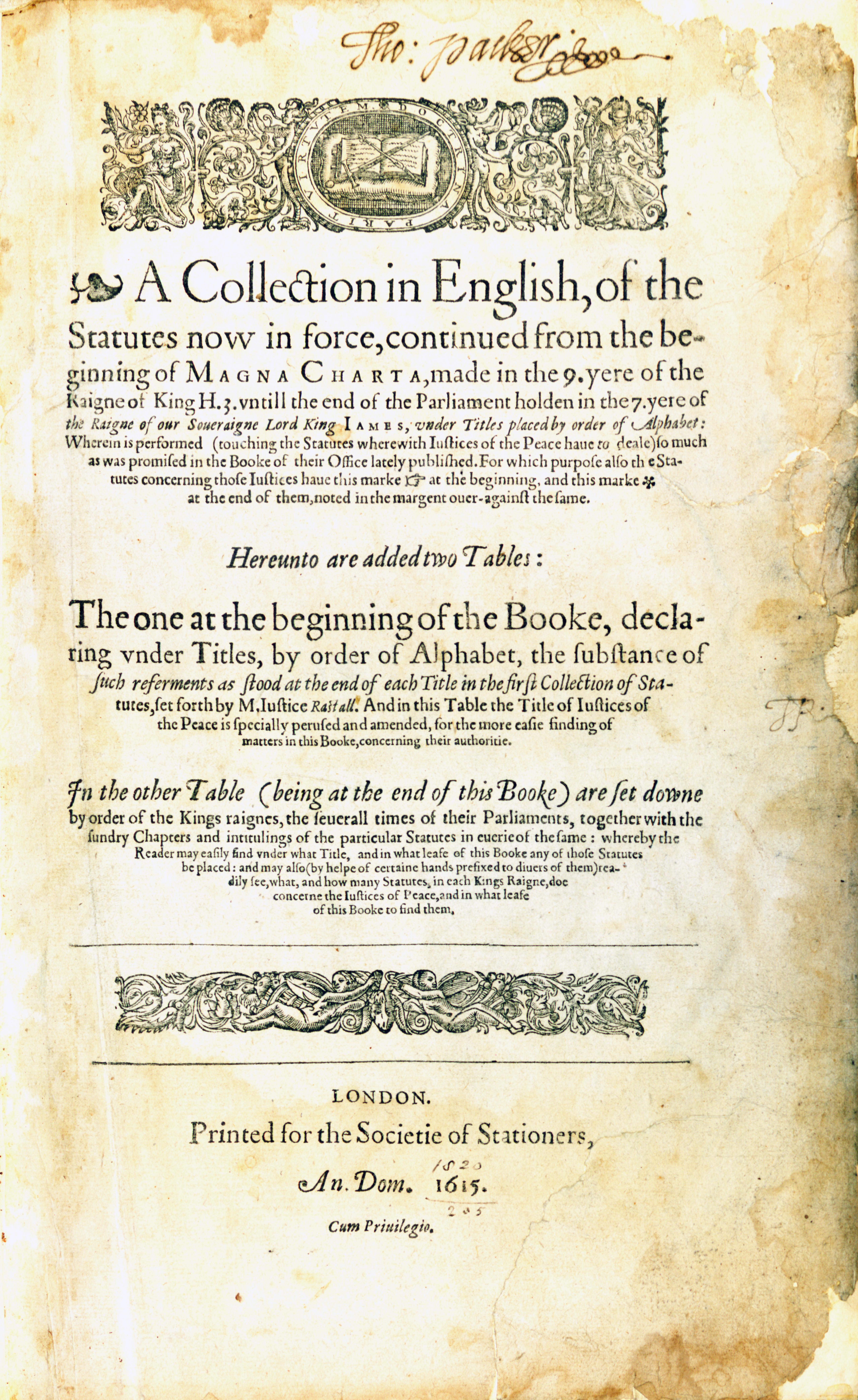
|
Rastell, William. A Collection in English, of the Statutes Now in Force, Continued From the Beginning of Magna Charta... London: Printed for the Societie of Stationers, 1615. |
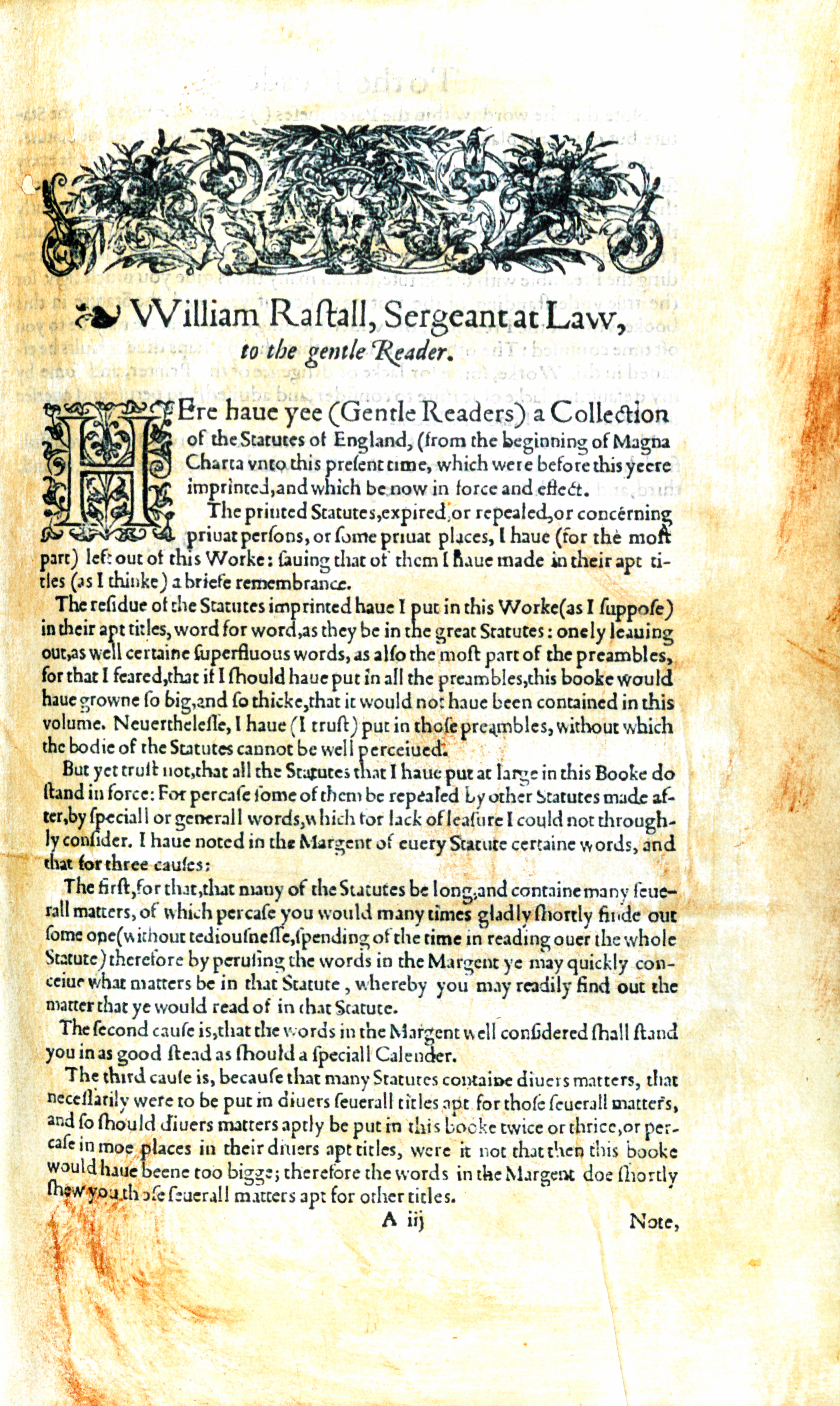
|
"To the gentle Reader," William Rastell, A Collection in English, of the Statutes Now in Force, 1615. |
|
A Treatise of Testaments and Last Wills (1743) Originally published in 1591, Henry Swinburne's book on testaments and wills quickly became the standard work in the field and remained in print in various editions until 1803. While the treatise testifies to the author's prodigious knowledge of civil and canon law, Swinburne (1521–1624) also wrote clearly and concisely, keeping the needs of students in mind. The General Assembly specifically named A Treatise of Testaments and Last Wills in a 1666 act requiring courts to purchase copies of law books. This copy, from the Wolf Law Library's George Wythe Collection, includes the signatures of multiple prior owners. |
|
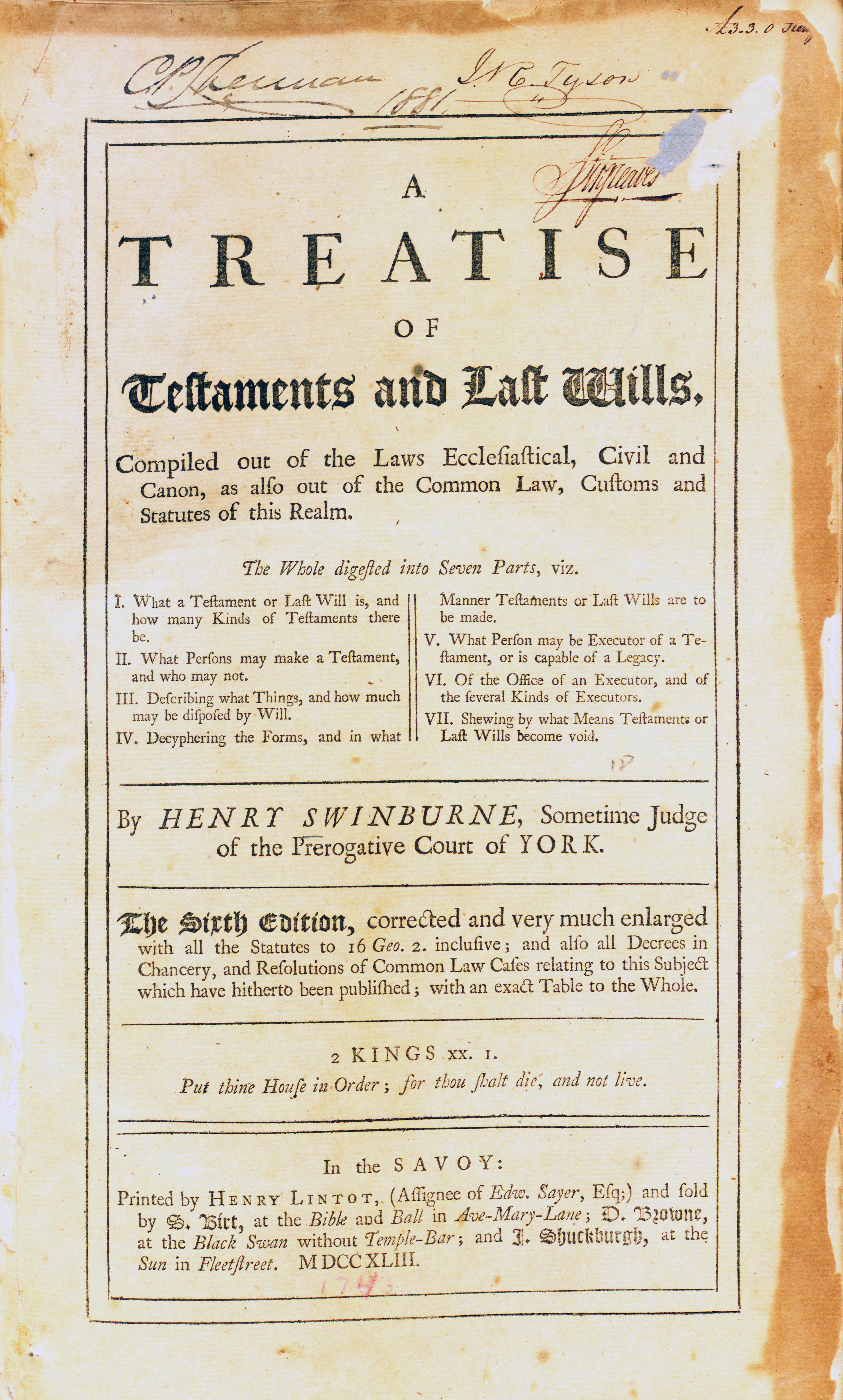
|
Swinburne, Henry. A Treatise of Testaments and Last Wills: Compiled Out of the Laws Ecclesiastical, Civil and Canon, as Also Out of the Common Law, Customs, and Statutes of This Realm. 6th ed. London: Printed by Henry Lintot, 1743. Wolf Law Library. |
|
The Office and Authority of a Justice of Peace (1736) A New Kent planter and attorney, George Webb (d.1758) was widely renowned for his legal scholarship. He assisted William Parks (1699–1750) in compiling A Collection of all the Acts of Assembly. Parks and Lt. Governor William Gooch (1681–1751) prevailed upon him to write this work. Known popularly as Webb's Justice, it was based on Virginia law and practice. As such it supplanted Michael Dalton's Countrey Justice or William Lambarde's Eirenarcha as manuals for Virginia magistrates until it was replaced in 1774. This copy is on loan from the Library of Virginia. |
|
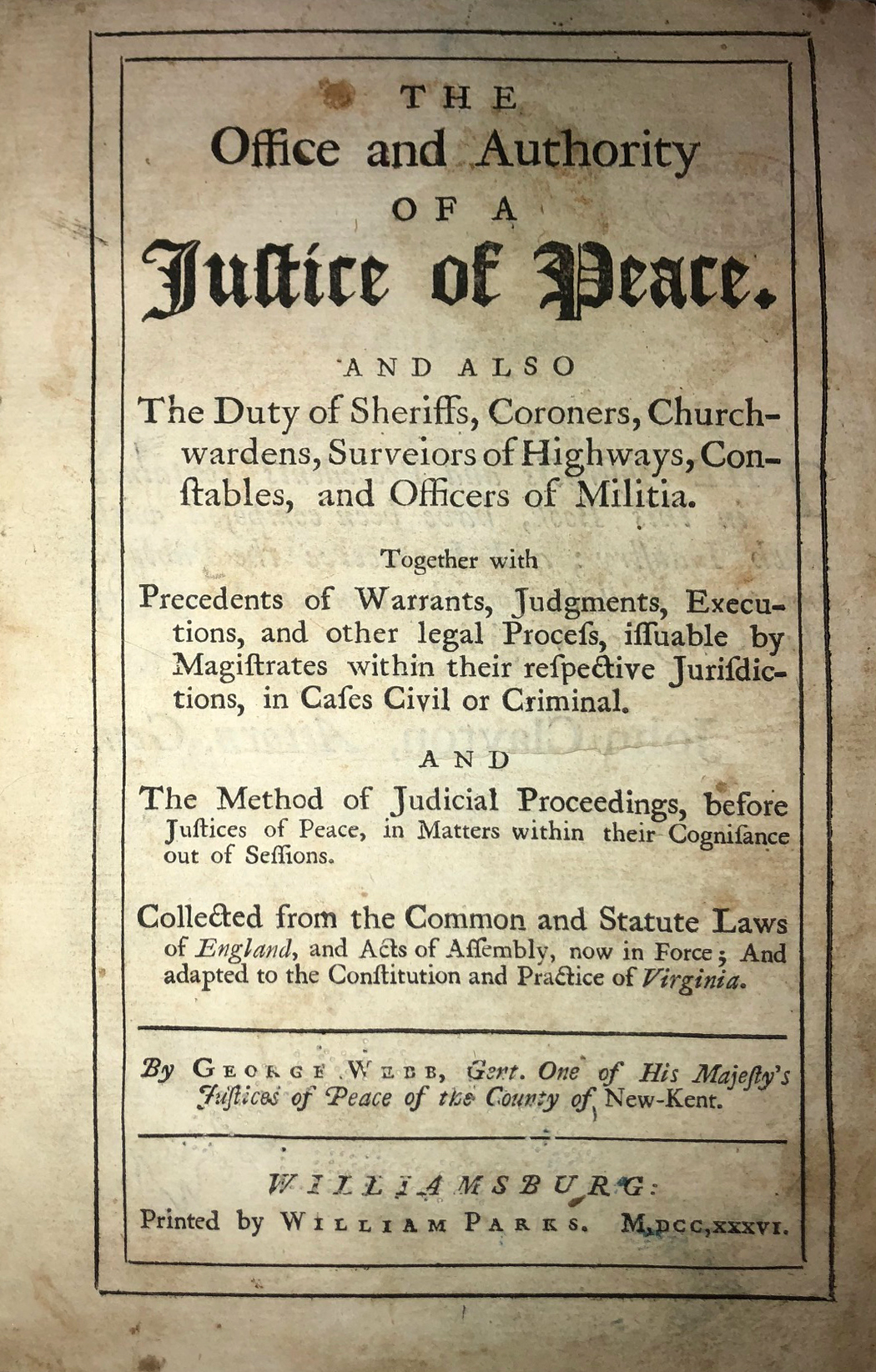
|
Webb, George. The Office and Authority of a Justice of Peace and Also the Duty of Sheriffs, Coroners, Church-Wardens, Surveiors of Highways, Constables, and Officers of Militia. Williamsburg: Printed by William Parks, 1736. Library of Virginia. |
|
Symboleographie (1647) First printed in 1590, this popular book of forms enjoyed broad circulation on both sides of the Atlantic. It was one of the books that George Thorpe (1576–1622) requested of Sir Edwin Sandys (1561–1629) when he created the General Court library in 1621. This copy of a later edition is on loan from a private library. |
|
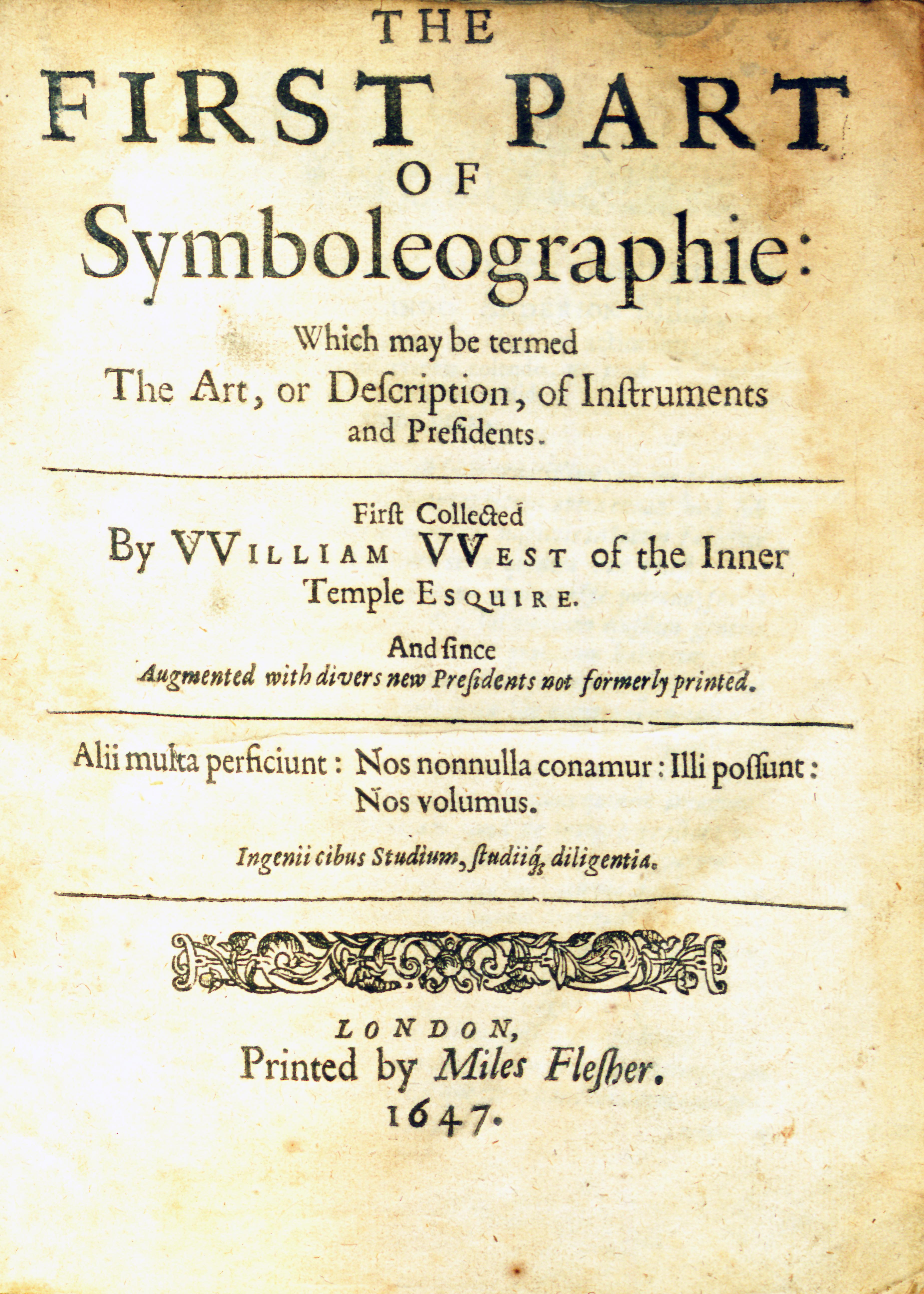
|
West, William. The First (–Second) Part of Symboleographie: Which May be Termed the Art, or Description of Instruments and Presidents. London: Printed by Miles Flesher, 1647. Private collection. |
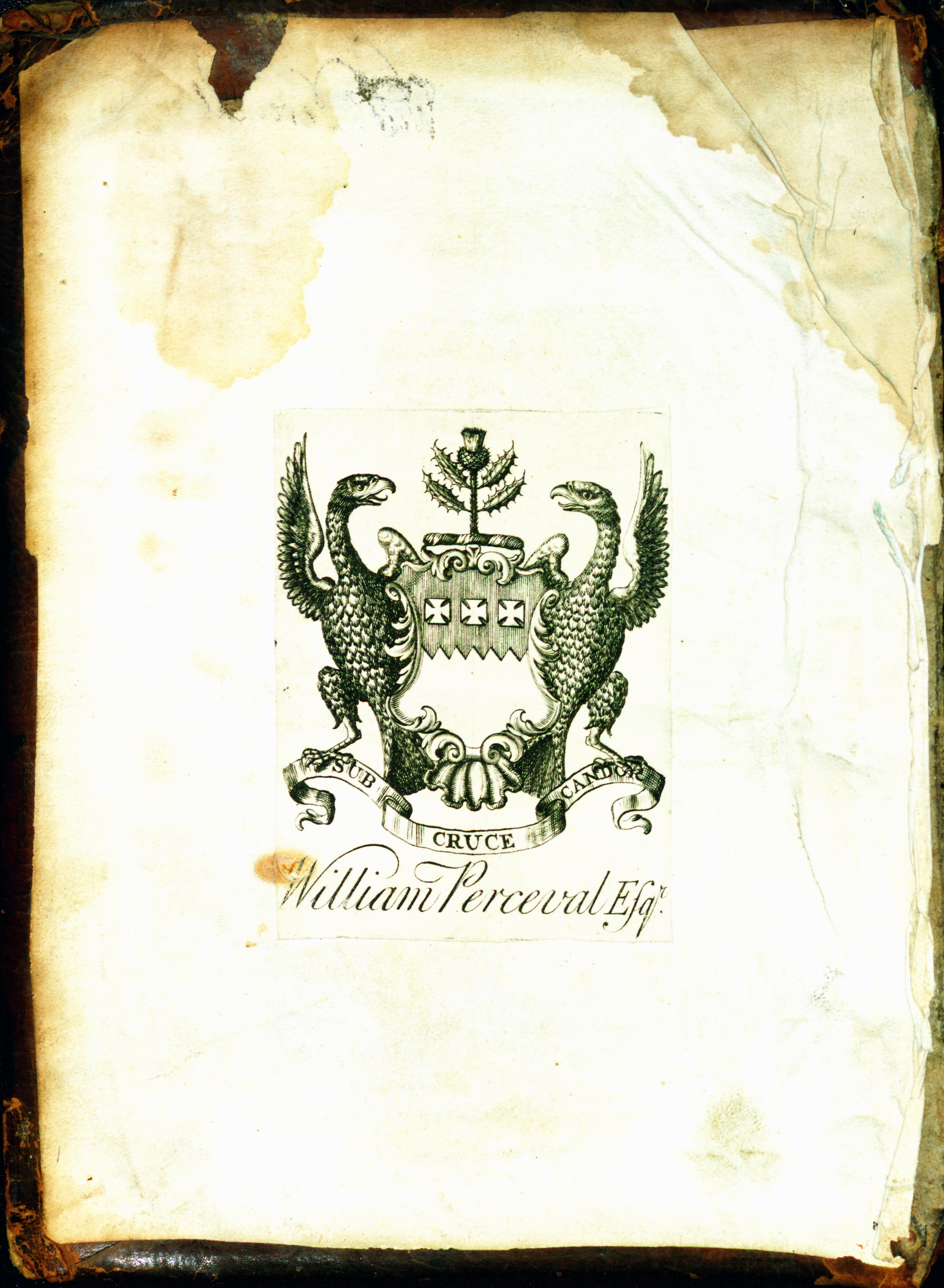
|
Bookplate of the Very Reverend William Perceval (1671–1734), Archdeacon of Cashel, Prebendary of St. John's, Dublin, and Dean of Emley, front pastedown of The Symboleographie by William West, 1647. Private collection. |
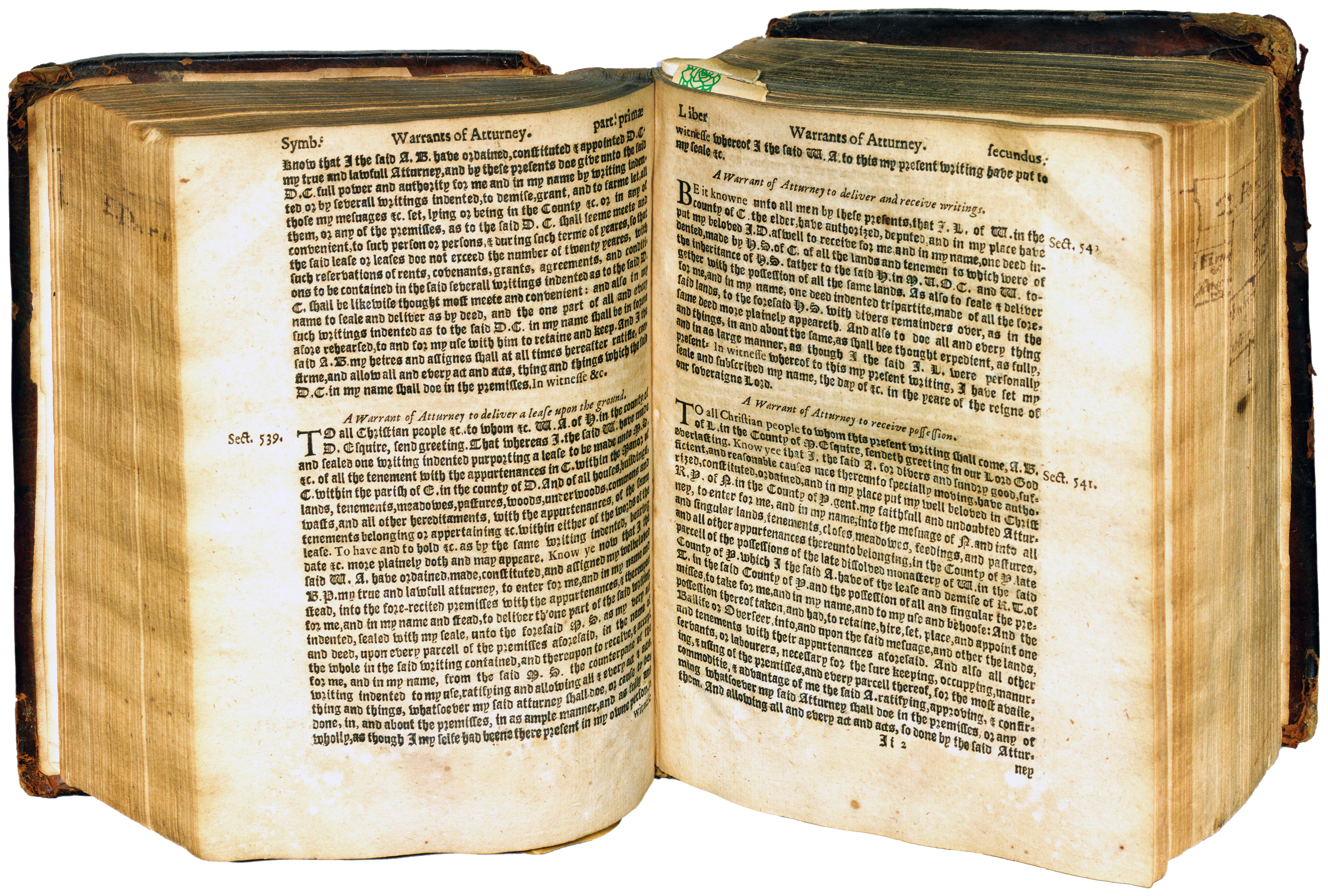
|
"Warrants of Attorney," The Symboleographie, by William West, 1647. Private collection. |



